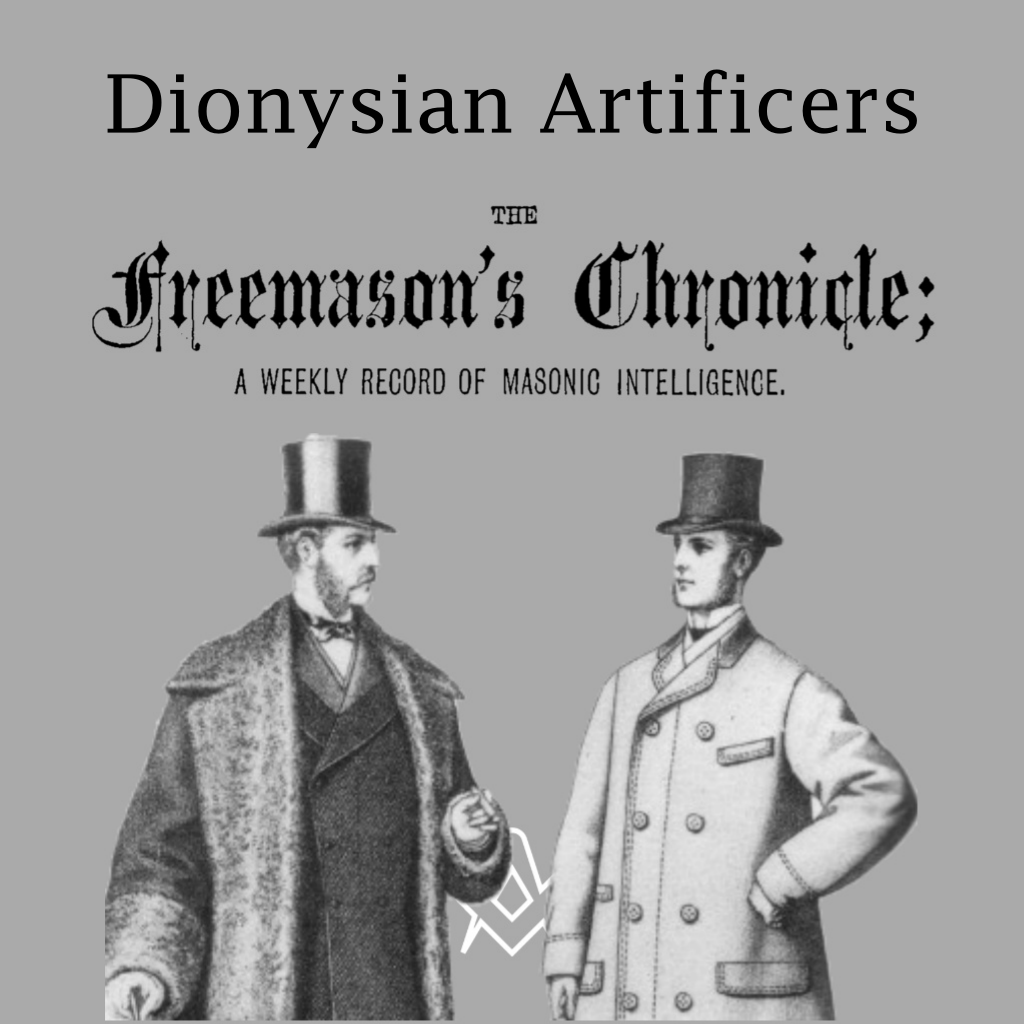Dionysian Artificers
Sketch for the History of the Dionysian Artificers,” a fragment, by Hyppoli to Joseph Da Costa, Esq. London: Sherwood, Neely and Jones. 1820.
This little work may be regarded as, so to speak, the Holy Grail of Masonry.
Although it was written only forty-five years ago, [101 years ago today] it is so scarce that the bibliomaniac may almost look in vain for a copy of it.
The late Dr. Crucefix, the projector of the Royal Masonic Benevolent Institution, made diligent search for the work during twelve years, and died without success. He had the highest opinion of its value.
Mr. R. Spencer sought in vain for it from 1848 until 1872, and we are indebted to the kindness of his son, Mr. W. Spencer, for the loan of the copy which lies before us.
It is, we believe, the only work in which are summarised the proofs of the resemblance of Freemasonry to the mysteries of Dionysus.
The author accurately quotes the authorities for his facts and opinions, and to this circumstance, as well as to the clear and concise style in which he has condensed a vast mass of unique information, the work owes much of its fame.
In these days, when a taste for speculative Masonry has been excited by the labours of modern philologists and archaeologists, a reprint of the work would be of the greatest value to the student.
We are proud to admit that a few learned and enthusiastic brethren are toiling with us in the congenial field of speculative research, and to those who desire to trace for themselves the fragments of the Dionysian mysteries, which are scattered through the literature of Greece and Rome, this little work would prove an invaluable guide.
Mr. Da Costa, the author, must have been a man of profound learning, and of large and liberal ideas.
His fragmentary sketch was written at a time when anything like a just appreciation of the mythology or religion of ancient Egypt or Greece was very rare.
It was the common opinion of men who passed for authorities that the system of ethics, which guided the wonderful people who flourished for so many ages ago on the banks of the Nile, was a degraded one, that their religion was a jumble of immoral fables and pseudo science, and that the gross degradation into which the Hellenic tribes sank was to be ascribed to the influence of their so-called superstitions upon the minds of the people
Even in these days of comparative toleration and enlightenment we occasionally come across a writer who is ignorant enough to confess his belief in the gross ” paganism ” of the ancient Egyptians, and the pulpit still resounds with the fierce denunciations of their supposed spiritual darkness.
Mr. DaCosta traces the ancient sun worship to a people living as far north as latitude 66°, in fact to the Atlantides, and thus raises the question which has so long troubled the minds of the learned, as to whether an island or continent, once the seat of civilisation, has or has not been submerged by the sea.
Atlantis is assumed by some writers to be the continent of America, and the significant fact that in Mexico archaeological remains and a system of picture writing, similar to that which prevailed in Egypt, have been found, would appear to give some colour to the theory.
That sun worship originated with a people where the great luminary of day was but a fitful visitant would appear to be a feasible idea, and its development southward in America and Asia may possibly be ultimately traced.
Scythia, that mystic region of the ancient Greeks, appears to the author to be the original seat of this worship.
To the Greeks Scythia was regarded as the earth’s remotest boundary, and readers of Aeschylus will remember that he lays the scene of the binding and punishment of the fabled Prometheus in this portion of the world.
It was there that the great and benevolent Titan was fixed to the rock. It was there that the bird of Jove made daily onslaught upon the helpless teacher of the arts and sciences.
The suggestion that Zoroaster was a Scythian can, we think, be scarcely supported by facts, but we readily agree with the writer that the teachings of this great man may have been imported from a northern clime.
That Egypt was indebted to a people living east of the Nile for its religious ceremonies is, we think, a fact that will sooner or later be clearly established.
That the Egyptians were Asiatic admits of no doubt. The type of face which is so familiar to all Egyptologers is not in the remotest degree African in its general outlines.
The Egyptian physique is slight, and affords a singular contrast to that of the lusty negro, whose muscular frame and low order of intelligence mark him as a being of an entirely different race.
We regard the Egyptians as colonists who, at a remote period, settled on the banks of the Nile, bringing with them the civilisation of Asia, and the germs of a religion which afterwards assumed a distinct type of its own.
The Osirian story, the earliest known myth of Egyptian theology, which may have been derived from the Persians, lies at the root of these Eleusinian rites, which are better known to most Masonic readers as the mysteries of Dionysius or Bacchus.
These consisted in the study of the sciences and useful arts, united with theology and ethics, and were communicated by cyphers or symbols.
Candidates for admission were required to be of pure life, and were rigidly examined, by properly appointed persons, before initiation.
The pith of the doctrine taught may be summed up in a few words.
The future state of the soul, and future rewards and punishments ; indeed, so high an estimate had the teachers of the value of the spiritual life, that the union of the soul with the body was regarded as its death, and the death of the body its resurrection.
In later Greek history these sublime ideas were no doubt degraded by the gross sensuality into which the Greeks had fallen, but their original purity is a fact, which no scholar will now dispute.
In Rome, the depravity of those who practised the Bacchanalian mysteries was the cause of great public scandal, and some of the early Christian writers, who knew nothing of their original meaning, were able to draw up a terrible bill of indictment against the decaying civilisation, upon the surface of which these per-verted ideas floated like scum.
It is to a colony of Greeks, settled in Asia Minor, that we are apparently indebted for the transmission of the rites of Bacchus, allied with the scientific truths of Craft Masonry, to modern Europe.
These Ionian Greeks were builders, and formed a society for the purposes of their calling. They were called the Dionysian Artificers, and they gradually spread themselves into Syria, Persia and India.
They extended their moral views in conjunction with the art of building to many useful purposes, and to the practice of acts of benevolence.
Prom Ionia or Asia Minor these artificers passed to Judea, and assisted in the building of the Temple which Solomon reared in honour of the tutelary God of Israel.
We cannot, however, agree with our author in the view quoted from Josephus that these artificers introduced the Grecian style of architecture into Judea.
Grecian details may undoubtedly have been used in the construction of the Temple, but its ground plan was so clearly Egyptian that we are inclined to the opinion that its main structural features were copied from the great buildings which lined the banks of the Nile.
That these artificers taught the mysteries which were mixed up with Masonry to the Jews, is undoubted, and it is supposed, from references in the great work of Josephus, that the sect of Essenians, of which John the Baptist is said to have been a member, grew out of this association of the mysteries of Bacchus with the ethical ideas common to the Jew.
Christianity itself appears to have been slightly tinged with the Essenian philosophy, and M. Renan has not hesitated to avow his belief that its divine founder was familiar with the dogmas of the sect.
We, while holding that Christianity stands alone, and is indebted to no human system for its sublime teachings, do not deny that its pure morality, and its early theories of communism find their counterpart in the views of the devout people, who, with John for a spokesman, prepared the way for a higher teaching and broader views of the social and spiritual duties of mankind.
It is needless for us to refer here to the pall of darkness which obscured all the light of the ancient world in the second and third centuries of our era.
In the night of the middle ages the teachings of the ancient sages were forgotten, and it was only with the revival of learning that the few remaining fragments of their teachings were gathered together and reanimated.
We here take leave of this interesting fragment, which has afforded us a text for these equally fragmentary remarks, and we cannot but regret that the work of Mr. Da Costa is so little known to our brethren and the world.
Notes:
The Dionysian Mysteries were a ritual of ancient Greece and Rome which sometimes used intoxicants and other trance-inducing techniques (like dance and music) to remove inhibitions and social constraints, liberating the individual to return to a natural state.
It also provided some liberation for men and women marginalized by Greek society, among which are slaves, outlaws, and non-citizens.
In their final phase the Mysteries shifted their emphasis from a chthonic, underworld orientation to a transcendental, mystical one, with Dionysus changing his nature accordingly.
By its nature as a mystery religion reserved for the initiated, many aspects of the Dionysian cult remain unknown and were lost with the decline of Greco-Roman polytheism; modern knowledge is derived from descriptions, imagery and cross-cultural studies.

Sketch for the History of the Dionysian Artificers, a Fragment
By: HIPPOLYTO JOSEPH DA COSTA (Author)
Sketch for the History of the Dionysian Artificers, a Fragment, published in 1820, was an attempt to prove that modern Freemasonry derived from ancient Greek philosophical and religious ideas.
Hippolyto da Costa was a Brazilian journalist, author, Freemason and world traveler.
He was imprisoned for being a Freemason by the Inquisition in Portugal in 1802 and escaped in 1805.
He later settled in London and wrote a two volume book about his experiences, Narrativa da Perseguição, in 1811.
He went on to start the first Brazilian periodical, the Correio Braziliense or Armazém Literário for which he is known today as “the founder of the Brazilian Press”.
The original is extremely rare and was scanned from a reprint by the Philosophical Research Society Press dated 1936, which notes that it was “made possible through the courtesy of the Masonic Grand Lodge Library at Cedar Rapids, Iowa”.
 The Freemasons Chronicle, a weekly record of masonic intelligence, was first published 2nd January 1875 London, England as an independent weekly journal of masonic interest and continued for 27 years.
The Freemasons Chronicle, a weekly record of masonic intelligence, was first published 2nd January 1875 London, England as an independent weekly journal of masonic interest and continued for 27 years.
It should be the business of a journal devoted to the interests of the Order to attempt the removal of prejudices such as these, which, though they may have little perceptible influence upon the prosperity of the Fraternity, yet have the effect of preventing timid or ill-informed persons from enlisting under its banner.
It will not only attempt to keep pace with the growing literary requirements of the day, but it will seek to exhibit the Order to the non-Masonic world divested of its technical details, and clothed in the garb of Charity and Brotherly Love.
The questions of the hour, which exercise the minds of thoughtful men, will be handled freely and broadly, without any tinge of political or sectarian bias.
The memoranda of Masonic gatherings which will appear from week to week, will be full and accurate; and as free interchange of opinion is one of the best signs of life and vigour in any society, ample scope will be given for Correspondence on topics of interest to the Order.
If we may venture upon a new rendering of words which recent events have made memorable, we will say here, once and for all, that we will be keen men of business, and will spare no effort, consistent with honour, to achieve commercial success; but first, and before all things, we will prove to our brethren and the world that we are FREEMASONS.
Recent Articles: The Freemason's Chronicle
 Operative And Speculative Masonry Explore the fascinating transition from Operative to Speculative Masonry in our latest post. Discover historical insights from Augustus C. L. Arnold and Rev. Wm. P. Strickland, shedding light on Freemasonry's evolution and its enduring principles. Dive into the rich history and significant milestones that shaped modern Freemasonry. - The Freemason's Chronicle - 2 September 1876 |
 Discover the true essence of Freemasonry, an ancient order founded on the profound principles of love for God and man. It's a call to rise above mere appearances, to embody genuine virtue and benevolence, transcending societal pretense. Embrace the transformative power of simplicity, and let the authentic glories of Freemasonry inspire your path. |
 Discover the intriguing story of a man who became a Mason but openly professed his dislike for the institution. Unravel the peculiar circumstances that led him down this path and explore the unexpected consequences that followed. Dive into this thought-provoking account that challenges our notions of loyalty and reveals the complexities of human nature within the Masonic fraternity. |
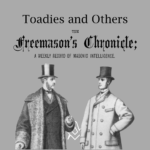 In the realm of Masonry, the principles of equality and respect are paramount. Yet, the presence of toadies—those who obsequiously seek favour from the influential—threatens these ideals. While Masonry embraces diverse beliefs and backgrounds, it rejects the sycophantic behaviours of toadies, flunkeys, and tuft-hunters, urging members to uphold genuine respect and self-worth. The Freemason's Chronicle - 22nd January 1876 |
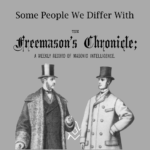 Unveiling the Unpleasant: Some People We Differ With Discover the intriguing dynamics of quarrels within the Masonic brotherhood. From the cantankerous to the litigious, the peevish to the vengeful, delve into the characters that challenge fraternal harmony. Explore their motives, temperaments, and the art of navigating disputes with these fascinating brethren. Brace yourself for a riveting journey into the world of conflicting personalities. |
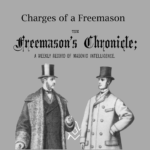 Unravelling the Masonic Mystique: A Deep Dive into the Freemasons' Charges - Explore the intricate world of Freemasonry, its principles, rituals, and the mechanisms for resolving internal disputes. Discover how this ancient fraternity fosters unity, promotes moral conduct, and upholds the sanctity of its secrets, while navigating the complexities of modern society. - The Freemason's Chronicle - 4 December 1875 |
 Unlock the hidden lessons of Masonic Studies! Don't settle for superficial knowledge or mere rituals. Discover the true depth and meaning behind Freemasonry. Expand your understanding of Tracing-Boards, Lectures, and more. Join regular Lodges of Instruction to enhance your Masonic journey. Become a knowledgeable Freemason, not just a token-bearer. Unleash the power of true Masonic wisdom today! |
 Uncover the incredible story of how Masonry saved the life of a Crimean War foot soldier in this historical and masonic account. Through the first hand experience of a soldier engaged in fierce hand-to-hand combat, witness the fateful encounter with a Russian Freemason that changed the course of his life. Learn how brotherhood and a deep dedication to the craft can lead to unforeseen and life-saving circumstances on the battlefield. |
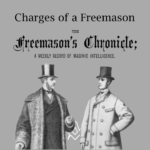 The Freemason's Chronicle - Charges of a Freemason The secrets of Masonry are the exclusive property of the Craft, and can never be communicated to one who is a mere labourer and not an accepted Mason. Hence, no labourer, that is, one who has not been regularly initiated in a legal Lodge. Article first published in The Freemason's Chronicle, 27 November 1875 |
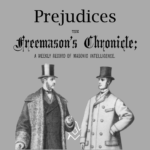 The Freemason's Chronicle - Prejudices Prejudices are partial judgments in favour of, or against certain persons or things, and, for convenience sake, may be ranged in two categories—those which are, comparatively speaking, harmless, and those which are harmful. Article first published in The Freemason's Chronicle, Oct. 2 1875. |
 The Freemason's Chronicle - Cliques Is Freemasonry - a Clique ? Man has been defined as a gregarious animal, but in his highly civilised condition he is gregarious only to a limited extent. First published in The Freemason's Chronicle, Oct. 2 1875, addresses the same challenges then as now. |
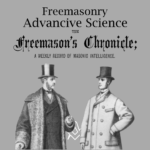 The Freemason's Chronicle - Freemasonry - an Advancive Science Is Freemasonry - an Advancive Science ? Not to confuse advancement with innovation. Has it been the case that Freemasonry's survival for 300 years plus is due to being an Advancive Science, tending to advance. First published in The Freemason's Chronicle 18 September 1875, addresses the same challenges then as now. |
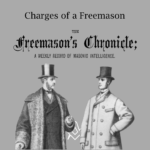 The Freemason's Chronicle - Charges Of A Freemason An interpretation of the "Charges of a Freemason", written Bro. Cornelius Moore and published in 1875, that introduce certain opinions that for some readers, will not sit well in contemporary times. - The Freemason's Chronicle, Sept. 11, 1875 |
 On The Order Of The Temple And Its Doctrine. THE Order of the Temple is divided into two great classes, denominated respectively the Order of the Temple and the Eastern Order. The Eastern Order gave birth to the Order of the Temple, and in the course of time has become an appendage of the latter. It is in ancient Egypt that we find the cradle of the Eastern Order. The Freemason's Chronicle, Sept. 4, 1875 |
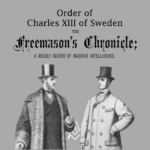 Order of Charles XIII of Sweden The following translation of the Manifesto of King JL Charles XIII of Sweden, on the occasion of his establishing the Masonic Order which bears his name, and of the Statutes of the said Order, may be interesting to our readers. The Freemason's Chronicle, Aug. 28, 1875 |
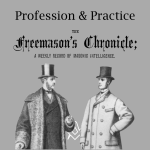 Most of our readers in the course of their experience, have doubtless met with enthusiastic brethren who take it for granted that a Mason can do no wrong. These enthusiasts are thoroughly convinced that the vast majority of those who join the Order are the most benevolent, the most moral, and the very noblest members of society. - The Freemason's Chronicle 10 July 1875 |
 An article investigating the relationship between masonry and citizenship. Are the principles of Freemasonry aligned with the freemason's claim to be a better citizen of the world? The Freemason's Chronicle - 19 June 1875 |
 A visitor must make clear his identity to the satisfaction of the Lodge he proposes to visit. More than once have we been asked to explain our views as to the reception of strangers in a Lodge. - The Freemason's Chronicle - 29 May 1875 |
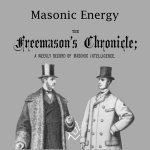 Is there reason in the accusation that Masonic energy looks only to a course of good feeds, when we can point to such grand results as have been achieved in these latter years, both in respect of the extension of our Order ? - 1May 1875 |
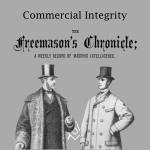 Implementing Freemasonry's peculiar system of morality in our day to day business affairs was the topic of this article, Commercial Integrity, first published in The Freemason's Chronicle - 8 May 1875 |
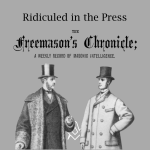 Ridicule has been somewhat illogically described as the test of truth. If it were so, Freemasonry ought to have perished long since. Two press reports from May 1875 covering the |
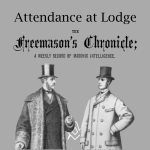 There are many things which Freemasonry will do for a man in the way of opening his mind and giving him larger and kindlier views of life, but Freemasonry itself, cannot eradicate the natural bias of the disposition. |
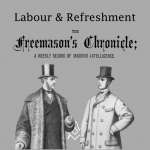 There is, we fear, too marked a tendency in very many Lodges to hasten through its labours, with a view to entering, as soon as possible, upon the business of refreshment. - The Freemason's Chronicle 17th April, 1875 |
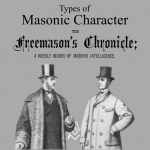 Another example that demonstrates that nothing really changes in Freemasonry. In an article the Types of Masonic Character published 145 years ago in The Freemason's Chronicle 10th April, 1875 |
 A brief history on the relationship between the British Monarchy and the craft - The Freemason's Chronicle 20th March , 1875 |
 What are the qualities of a convivial man and how does this dovetail perfectly in to Freemasonry ? 16th March, 1875 |
 A review of the "Sketch for the History of the Dionysian Artificers," a fragment, by Hyppoli to Joseph Da Costa - This little work may be regarded as, so to speak, the Holy Grail of Masonry. |
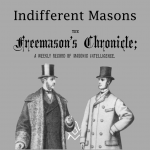 Nothing really changes, an article Indifferent Masons, From Le Monde Maçonnique 1874. Translation published in The Freemason's Chronicle 20th February, 1875 |
 In handling an intruder in the lodge, we endeavoured to show that a good Mason should be a gentleman, and a sincere man. The Freemason's Chronicle 20th February, 1875 |
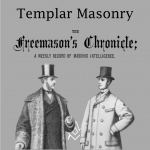 Templar Masonry - a historical aspect of the Religious and Military Order of the Temple published in The Freemason's Chronicle 13th February, 1875 |
 Secrecy perhaps the strongest objection urged by the enemies of the Masonic Order against its existence published in The Freemason's Chronicle 20th March 1875 |
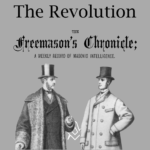 Freemasonry In The United States during And After The Revolution We take a look at Freemasonry in the United States during and after the Revolution first published in The Freemason's Chronicle - February 6, 1875 |
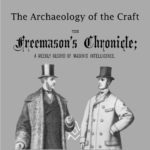 We take a look at the archaeological connection with the Craft, first published in The Freemason's Chronicle - January 30, 1875 |
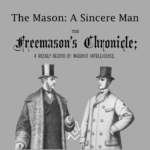 What it means to a Freemason to be a sincere man. Extract: first published in The Freemason's Chronicle - January 23, 1875 |
 What it means to a Freemason to be a citizen of the world ? First published in The Freemason's Chronicle - January 16, 1875 |
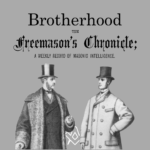 Brotherhood! In that one word what sympathetic associations arise. First published in The Freemason's Chronicle - January 9, 1875 |
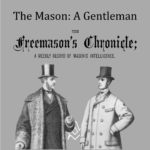 This opening article was written 145 years ago, yet it resonates with Freemasons today as it did then. First published in The Freemason's Chronicle, January 2, 1875, Issue 1 |
masonic knowledge
to be a better citizen of the world
share the square with two brothers

click image to open email app on mobile device


